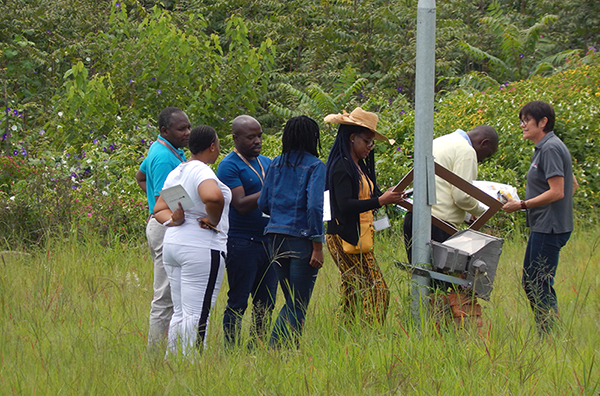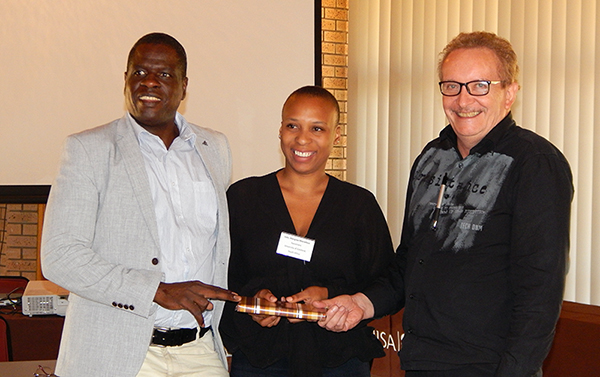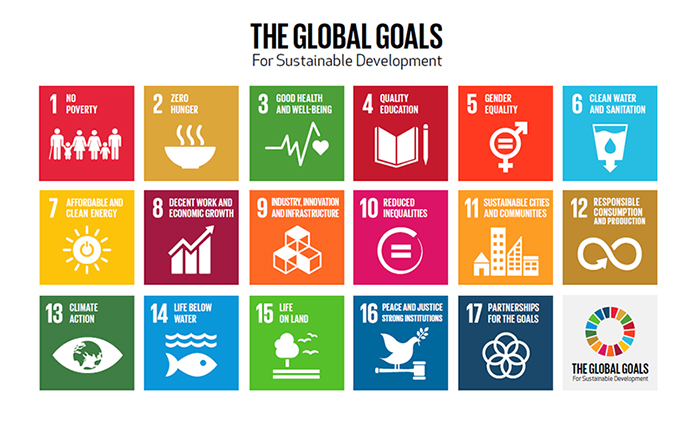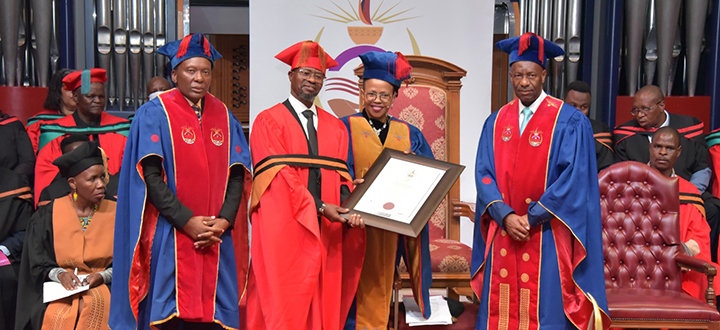College of Agriculture & Environmental Sciences
How we respond to SDGs influences Africa's readiness for pandemics
The COVID-19 pandemic was still in its early stages when Unisa hosted its annual Research and Innovation Week in the first week of March 2020. Looking back, however, it is clear that many of the topics discussed then have considerable relevance now as the current health crisis rampages through the world.

Hands-on group work during the pre-symposium workshop on the application of geographical information systems in sustainability research: Sanet Carow (Department of Geography, Unisa) (right) assists participants to capture field data on their devices in preparation for a practical GIS exercise.
"There have always been pandemics in the world but what is important is our response. Effective implementation of the United Nations’ sustainable development goals (SDGs) can help a great deal with that response," says Prof Rudi Pretorius, associate professor at the Department of Geography and one of the organisers of the R&I Week symposium entitled "Accelerating the implementation of the SDGs in Africa".
The SDGs are what governments around the world have agreed to focus on to achieve a better and more sustainable future for everyone. But there are wide variations in how much attention governments pay to the SDGs in practice.
An example that stands out, considering the current pandemic, is the SDG "Good health and wellbeing".
"In the past 10 years, many Asian countries have been spending enormous amounts on healthcare compared to quite a few countries in the West, where there is a huge gap in the availability of hospital beds," says Pretorius, referring to the shortage of beds and medical equipment in the United States, Spain, Italy and other countries hit hard by the COVID-19 pandemic.
The health and wellbeing SDG is not the only one pertinent to a health crisis such as a pandemic, Pretorius says. "The 17 SDGS are interrelated and interdependent. You cannot pick one or two to focus on and exclude the rest. They are all interconnected."
For example, there are clear interlinkages between no poverty (SDG 1), zero hunger (SDG 2), good health and wellbeing (SDG 3), quality education (SDG 4) and gender equality (SDG 5), and so on down the list.
That is why, when it comes to university research on sustainability, it is best not to overspecialise. "You need a holistic picture of the interconnections," Pretorius says.

Dr Inocent Moyo (University of Zululand) and Hlengiwe Cele (University of Zululand) receive the award for runner up to the best paper from Prof Rudi Pretorius (Department of Geography, Unisa). Their paper was entitled "Protected areas and environmental conservation in KwaZulu-Natal, South Africa: On marginalisation, livelihoods and sustainable development".
Symposium part of a global series
The bigger picture was clearly in evidence at the SDG seminar, which was part of a series of similar events being held worldwide. The hosts of these events are the Inter-University Sustainable Development Research Programme of Manchester Metropolitan University and the Hamburg University of Applied Sciences in Germany. The local partner for the South African event was Unisa, specifically the School of Ecological and Human Sustainability at the College of Agriculture and Environmental Sciences.
Speakers came from 12 South African universities and research institutes, as well as the UN Educational, Scientific and Cultural Organisation (UNESCO) and the Youth Development Services Centre of Zambia.
The papers ran the gamut of sustainability research in relation to SDGs, from tourism development and entrepreneurship to community engagement, clothing and textiles, water and sanitation, socio-economic opportunities for communities, and the role of libraries in promoting SDGs. Here are a few of the points made during the symposium:
- The water-energy-food nexus is at the heart of sustainable development and requires "transformational shifts" that balance people and planet, enabling people to live in harmony with each other and with nature, according to Prof Hubert Gijzen, UNESCO regional director for Southern Africa, who gave the keynote address.
- The clothing and textiles industry is one of the most polluting industries worldwide and Africa, including South Africa, has a "tremendous culture of overconsumption", said Unisa’s Lorna Christie. One way to create the opposite, a culture of conscientious clothing consumption, could be to educate small and medium enterprises that manufacture custom-made apparel about a pro-environmental approach to their business.
- On average, only 17% of Unisa’s Environmental Sciences students are involved in campus greening and environmental events, said Albert Mawonde and Mucha Togo of the Environmental Sciences Department. The main reasons, revealed through an online survey, are that students do not live on or near campus, lack financial resources, have misconceptions about campus greening and are not interested in participating. This could change if opportunities were to be created for greater student involvement as part of the curriculum, campus research projects, community engagement and work-integrated learning, and incentives such as certification and competitions.
- Biodiversity and ecosystems are changing in Africa, which has five plausible future scenarios - three of which would see negative impacts persisting, according to Prof Emma Archer of the University of Pretoria. The other two plausible futures prioritise environment and sustainability. They are the most likely paths towards achieving long-term development objectives without compromising Africa’s biodiversity and ecosystems.
- Stringently protectionist policies in environmental conservation in Protected Areas do little to address poverty because they lead to the marginalisation of indigenous communities, said Hlengiwe Cele of the University of Zululand, KwaZulu-Natal. Innovative approaches to environmental conservation are needed, fully considering the developmental needs of indigenous communities and at the same time protecting the environment.
 True to its inclusive character, the symposium had two community outreach components. One was a presentation by Food and Trees for Africa, a development organisation that focuses on food security, urban greening and environmental sustainability. The other was a pre-symposium workshop to demonstrate the use of geographical information systems (GIS) in the field of sustainability.
True to its inclusive character, the symposium had two community outreach components. One was a presentation by Food and Trees for Africa, a development organisation that focuses on food security, urban greening and environmental sustainability. The other was a pre-symposium workshop to demonstrate the use of geographical information systems (GIS) in the field of sustainability.
One of the most important purposes that the symposium served was to contextualise the SDGs for Africa, says Unisa’s Pretorius. "The SDGs are an international, United Nations initiative, and were not developed by Africa for Africa. This means it is important to contextualise the SDGs for our continent, which higher education institutions are in a good position to do."
Localised SDGs make it easier to set priorities and allocate resources – and ultimately to respond swiftly and effectively to the challenges of the 21st century, from climate change to a viral pandemic.
* By Clairwyn van der Merwe, Contract writer, Directorate of Research Support
Publish date: 2020-04-25 00:00:00.0

 Young Unisa science stars join elite Lindau Nobel Laureate group
Young Unisa science stars join elite Lindau Nobel Laureate group
 Education MEC addresses Unisa autism seminar
Education MEC addresses Unisa autism seminar
 Seven Unisans nominated for the NSTF-South32 Awards 2023/2024
Seven Unisans nominated for the NSTF-South32 Awards 2023/2024
 Unisa awards posthumous honorary doctorate to literary maven, OK Matsepe
Unisa awards posthumous honorary doctorate to literary maven, OK Matsepe
 From humble beginnings to academic leadership
From humble beginnings to academic leadership